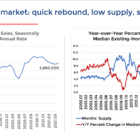News
Detroit housing market sees surge
|
The demand for houses has been on a steady rise since in-person activities have returned, however, the number of houses hasn’t increased, making it a seller’s market in Detroit. Home sellers are ready to welcome buyers to browse and sell to the highest bidder.
“We had a week of open houses, but we got an offer on like the third day,” said Leah Yankee, a resident of North Rosedale Park. “Several people told me it would go fast but it went very quickly.”
Yankee sold her home in July and said buying her current home was just as competitive as selling her previous home.
“I do know that home prices are high right now, and our home was considered a ‘hot home’,” said Yankee. “My understanding seems to be North Rosedale Park is maybe getting a little hip, but there was somebody else that looked at it before us and we were very anxious.”
United States housing market patterns by the National Association of Realtors
Byron Suggs, a realtor and mortgage specialist at Paramount Mortgage Group, said the housing shortage is due to a buildup of demand without distributing any supply for about a year.
“It’s a seller’s market like never seen before,” said Suggs. “I think the main thing is it’s taken a long time to catch up from the lack of inventory started last year.”
Suggs said for the past year sellers haven’t been comfortable allowing buyers into their homes and buyers haven’t been comfortable purchasing without seeing the house in person.
“The thing is, with the way the market is, you got a nice home and put it on the market, you’re going to get several offers over the weekend,” said Suggs.
